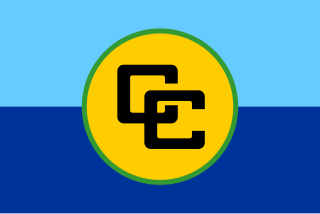
The Caribbean Community is an intergovernmental organisation that is a political and economic union of 15 member states throughout the Americas and Atlantic Ocean. They have primary objectives to promote economic integration and cooperation among its members, ensure that the benefits of integration are equitably shared, and coordinate foreign policy. The organisation was established in 1973, with its four founding members signing the Treaty of Chaguaramas. Its primary activities involve:

The Organisation of Eastern Caribbean States is an inter-governmental organisation dedicated to economic harmonisation and integration, protection of human and legal rights, and the encouragement of good governance between countries and territories in the Eastern Caribbean. It also performs the role of spreading responsibility and liability in the event of natural disaster.

The Commonwealth Caribbean is the region of the Caribbean with English-speaking countries and territories, which once constituted the Caribbean portion of the British Empire and are now part of the Commonwealth of Nations. The term includes many independent island nations, British Overseas Territories and some mainland nations.
The following is a list of heads of government of the members states of CARICOM:

The CARICOM Single Market and Economy, also known as the Caribbean Single Market and Economy (CSME), is an integrated development strategy envisioned at the 10th Meeting of the Conference of Heads of Government of the Caribbean Community (CARICOM) which took place in July 1989 in Grand Anse, Grenada. The Grand Anse Declaration had three key Features:
- Deepening economic integration by advancing beyond a common market towards a Single Market and Economy.
- Widening the membership and thereby expanding the economic mass of the Caribbean Community.
- Progressive insertion of the region into the global trading and economic system by strengthening trading links with non-traditional partners.

The Regional Security System (RSS) is an international agreement for the defence and security of the eastern Caribbean region with future expansion planned with South America.

The Caribbean Free Trade Association (CARIFTA) was an english speaking economic trade organization. It organised on 1 May 1968, to provide a continued economic linkage between the English-speaking countries of the Caribbean. The agreements establishing it came following the dissolution of the West Indies Federation which lasted from 1958 to 1962.

The CARICOM Regional Organisation for Standards and Quality (CROSQ) is a regional standards body for the Caribbean Community CARICOM bloc of countries.
The nation of Barbados has been a supporter of the Caribbean Community (CARICOM). Barbados was one of the four founding members in 1973 which then along with Guyana, Jamaica, and Trinidad and Tobago moved to establish the organization then known as the Caribbean Community and Common Market. This new organization became a successor to the Caribbean Free Trade Association (CARIFTA) of which Barbados was also a member.

The Partnership for Prosperity and Security in the Caribbean (PPS) is a regional-level dialogue with the stated purpose of providing greater cooperation on security and economic issues. The Partnership was founded in Bridgetown, Barbados on March 10, 1997 by the Governments of the United States of America, Antigua and Barbuda, the Commonwealth of The Bahamas, Barbados, Belize, the Commonwealth of Dominica, the Dominican Republic, Grenada, the Co-operative Republic of Guyana, the Republic of Haiti, Jamaica, the Federation of St. Kitts and Nevis, Saint Lucia, St. Vincent and the Grenadines, the Republic of Suriname and the Republic of Trinidad and Tobago.

The Caribbean Link for Guiding is a consortium of 21 Girl Guide Associations from throughout the Caribbean. These include associations from independent countries as well as from British Overseas Territories, coordinated by Girlguiding UK. It was created in 1958.
Julian Ernest Chetvynde Rogers MBE is a Caribbean broadcaster and journalist. He has worked as broadcast manager, TV and radio host and producer, publisher, trainer, lecturer, media consultant and public relations professional. Involved since the 1970s with the building of national radio stations notably in Barbados, St Kitts & Nevis, and Antigua & Barbuda, and part of "the original team set up to 'revolutionise' the media industry in Trinidad & Tobago with the rebranding of the Trinidad and Tobago Television Company (TTT) into CNMG", he has been called "the Caribbean man" and has established a reputation as one of the region's most respected media practitioners. His characteristic style as a broadcaster is to conduct biting interviews; one commentator refers to "the persistent journalistic exploits of a resurgent, sharp-witted and emphatic Julian Rogers".
CARIPASS is a voluntary travel card programme that will provide secure and simple border crossings for Caribbean Community (CARICOM) citizens and some legal residents of CARICOM nations. The CARIPASS initiative is coordinated by the Implementation Agency for Crime and Security, and seeks to provide standardised border control facilities within participating Caribbean communities.
The economy of the Americas comprises more than 1 billion people in 35 different countries and 18 territories. Sometimes divided into the continents of North America and South America depending on the source, like other continents, the wealth between the states in the Americas varies considerably, with significant wealth inequality within nations. The difference in wealth across the Americas can be seen roughly between the economies of North America and South America, with the countries in the former significantly better off than those in the latter.

The British Overseas Territories maintain their own entry requirements different from the visa policy of the United Kingdom. As a general rule, British citizens do not have automatic right of abode in these territories.
The Caribbean Agricultural Research and Development Institute (CARDI) carries out research and development for agriculture in the Caribbean region. Its headquarters are on the campus of the University of the West Indies (UWI), at St. Augustine in Trinidad and Tobago and it also has national offices throughout the region.
The Caribbean Farmers Network (CaFAN) was formed in 2004 following exploratory discussions amongst farmer organizations in 2002. It is a regional network of Farmers' Associations and Non-governmental organizations in the Caribbean, with its headquarters in Saint Vincent and the Grenadines. Members of CaFAN presently consist of farmer associations from Antigua and Barbuda, Barbados, Bahamas, Belize, Dominica, Grenada, Guyana, Jamaica, St Kitts/Nevis; St Lucia, Saint Vincent and the Grenadines, Trinidad and Tobago and Suriname.
The Saint Lucia national football team represents Saint Lucia in international football under the control of the Saint Lucia Football Association (SLFA). Although a Saint Lucia representative team had played previously, the football association was founded in 1979. It became fully affiliated to CONCACAF in 1986 and joined FIFA two years later.

The Caribbean Telecommunications Union (CTU) is an intergovernmental organization established by CARICOM in 1989, to facilitate development of the telecommunications sector in the Caribbean.











